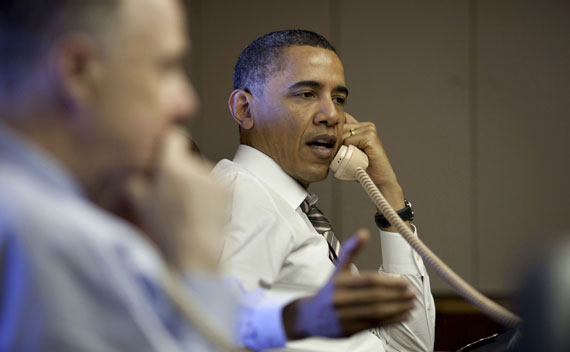How Do You Say 1989 in Arabic?
More on:

I have been surprised that President Obama has taken so much guff over the Libya situation and his handling of the Arab Spring, more generally. Ben Smith at Politico calls it the “narcissism of small differences.” He makes the point that the arguments and counter-arguments over the White House’s handling of the uprisings are more about tactics than strategy. The punditocracy and political folks tend to lose sight of the fact that the administration is confronting one of the hardest political challenges that any administration could face. Momentous change is happening in an important part of the world and Washington has little ability to influence the trajectory of events short of applying military force as it is doing in Libya.
It’s safe to say there is no playbook for the uprisings and revolutions roiling the Middle East. In the last few months, I have often been asked “Is this the Middle East’s 1989?” There is a temptation to make a connection between the fall of communism in Eastern and Central Europe and the cracking of regimes all over the Arab world. The speed at which the uprisings spread from Tunisia to Egypt to Libya and Bahrain and Yemen are, indeed, reminiscent of the fast forward changes that took place in the fall of 1989. Mu’ammar Qadhafi may very well be the Middle East’s Nicolae Ceausescu. Still, 1989 has nothing on the 2011 winter-spring of Arab discontent. President Obama and his team have few partners in the region to help them realize the peaceful and orderly transitions that the administration desires. There are no Arab analogues to Helmut Kohl, Margaret Thatcher, and Francois Mitterand with whom Obama can work to help bring about soft landings. King Abdallah of Jordan is facing his own domestic turmoil; Morocco’s Mohamed VI is in no position to help; Abdelaziz Bouteflika of Algeria is on the uprising/revolution watch list; the Qataris are influential, but not in the right way because Arab dictators under fire blame al Jazeera for their troubles; in Oman, Sultan Qaboos is dealing with the aftermath of unrest that broke out last month, and Saudi Arabia’s King Abdallah is working at cross purposes with the Obama administration, offering support for leaders confronted with mass demands for political change.
This is an extraordinarily tough political environment in which Washington’s influence and leverage is limited, at best. So when the talking heads get going this evening after President Obama’s address to the nation from National Defense University, keep in mind that they are engaged in the ultimate Monday-morning quarterbacking. With no precedent, no playbook, and no leverage to speak of, I am not sure anyone who was sitting in the White House would be doing any better.
More on:
 Online Store
Online Store